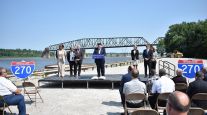Illinois Budget Puts State Roads in Crisis, Advocates Say

Six months after lawmakers hastily passed their first state budget in two years, transportation advocates are sounding the alarm on a little-noticed item that will take $300 million from road repairs to pay other expenses each year.
Many lawmakers have only recently been briefed on the measure, which escaped much notice at the time. It stems from limited funding and other legislative priorities, with lawmakers acting under intense pressure after two years without a budget and the state’s backlog of unpaid bills topping $14 billion.
“This (move) was a total surprise,” said Macon County Engineer Bruce Bird. “You know, (county engineers) were told by the folks at (the Illinois Department of Transportation), when they had discussions with legislators, it was ‘We did what?’ So I’m guessing it’s a surprise to just about everybody.”
The result, transportation advocates say, is a fatal blow to the Illinois Department of Transportation’s construction schedule that was already struggling to keep up with deteriorating roads and bridges. After the budget passed, IDOT’s planned highway improvements went from 400 miles of work to 189, a fraction of the more than 3,500 miles of state roads currently in need of reconstruction across Illinois.
RELATED: Highway work will stop in Illinois if legislature aails to act, IDOT says
An IDOT spokeswoman said the department remains committed to “creating and maintaining a world-class system of infrastructure.”
“The department will continue to work with all stakeholders on this mission and to strengthen the state’s status as the transportation hub of North America,” said spokeswoman Kelsea Gurski.
Most of the diverted money is paying for bonds that were used to make already-completed improvements to the Regional Transit Authority, which serves public transit in the Chicago area.
Before the budget agreement, IDOT’s capital plan said 40 percent of all state roads would be in need of repair by 2023. Now, the road fund, which is the primary bank account for Illinois’ transportation spending, will be depleted well before then.
“We had a tourniquet on that was starting to fall off,” said John Lowder, a lobbyist whose clients include the Transportation for Illinois Coalition. “Now we’re opening up arteries, and we’re bleeding out now.”
When asked about the road fund diversion, the governor’s office and state Senate leaders each blamed their political enemies.
“The idea for this came from the Senate Republicans on behalf of the Rauner administration,” said John Patterson, spokesman for Senate President John Cullerton, D-Chicago.
A spokesman for Senate Minority Leader Bill Brady’s office responded in an email. “This was a proposal that Democrats adopted, put in their budget and passed mostly with Democrat votes in the Illinois Senate.”
A spokeswoman for Rauner said Brady’s proposal as the lead Republican budget negotiator included $180 million from the road fund to pay for RTA bond payments. “The Democrats’ enacted FY18 budget, which Gov. Rauner vetoed, increased this cost shift to approximately $300 million,” spokeswoman Elizabeth Tomev said.
This all comes despite the fact that transportation advocates enjoy a strong bipartisan cadre of supporters: trades unions, whose members carry out the work for capital projects, and business leaders, whose companies rely on a strong transportation network to keep up the flow of commerce.
“I have trucks going all over the place, and I can tell there are a lot of roads where you can’t avoid the issues,” said John Skeffington, president of Decatur-based Skeff distributing, a major beer distributor in Central Illinois. “You can really tell as you drive west, when you get back to Illinois. It’s a mess.”
“Every $1 million in road project spending equates to about 15 (full-time construction) jobs,” said David Tyrolt, president of Dunn Company in Decatur. “So (that loss) of $300 million represents 4,500 jobs across the state that are going to be lost. Our employees, they’ll suffer some of that loss themselves.”
RELATED: Illinois considering closing some highway rest areas
IDOT’s highway improvement plan for the current fiscal year had to eliminate more than 200 miles of construction work. Before the July budget agreement, the agency had planned to repeat its average workload — about 400 miles a year.
Kevin Burke, vice president of the Illinois Asphalt and Pavement Association, says IDOT would need to complete work on 800 miles of state road every year in order to keep its current conditions, which are already noticeably bad. “We were bleeding at 400 miles of roads a year (before the budget deal),” he said. “Now we’re bleeding at 600 miles a year.”
For businesses like Skeff in Decatur, the silver lining would be that IDOT officials would likely prioritize main thoroughfares like the interstate system and national highways like Interstates 55 and 72, and U.S. 51.
“But (Illinois 121), some of the lesser routes are going to be the ones that start to deteriorate,” Lowder said.
The stakes are that much higher for road funding considering the unique relationship between state and federal funding. Traditionally, the U.S. Department of Transportation has paid for close to 80 percent of states’ highway projects, but only after the work has been completed.
Put another way, in order for Illinois to receive the maximum amount of federal highway dollars, it has to have enough available cash. “IDOT needs to be able to fund projects that are a lot larger than the actual cost, so they have to have cash flow to then get reimbursed,” Burke said.
While 26 states have raised their motor fuel tax since 2013, Illinois’ has stayed at 19 cents a gallon since 1990.
“A lot of states have been stepping up to the plate the last few years,” said Brian Turmail, director of public affairs at Associated General Contractors of America. “I think (Illinois is) in the most dire situation.”
The specter of another tax increase in Illinois is daunting both for elected officials and residents, such as Jeanne Hanson in Decatur.
“They’ll raise the taxes to cover that, and then they’ll borrow the money to pay for something else,” she said. “I don’t trust Illinois government.”
Still, Turmail said, taxes collected and used for a specific purpose, like motor fuel taxes, tend to be more popular with voters. Focus groups show that people prefer knowing they will pay for a specific purpose, with a result that they can see will provide a direct benefit to them.
Transportation advocates say a major lift will have to take place just to prevent a slide of road conditions today, with more revenue and bond sales together.
“We’re not even talking about money that we need for new roads, congestion relief, or airports. This is the most important,” Lowder said. “This has got to be reversed.”
Distributed by Tribune Content Agency, LLC




